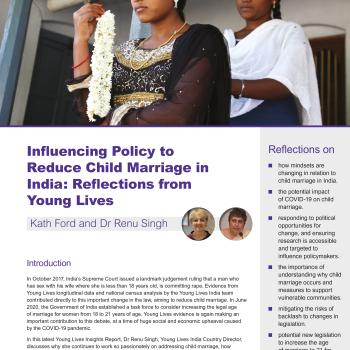
In October 2017, India’s Supreme Court issued a landmark judgement ruling that a man who has sex with his wife where she is less than 18 years old, is committing rape. Evidence from Young Lives longitudinal data and national census analysis by the Young Lives India team contributed directly to this important change in the law, aiming to reduce child marriage.
In June 2020, the Government of India established a task force to consider increasing the legal age of marriage for women from 18 to 21 years of age. Young Lives evidence is again making an important contribution to this debate, at a time of huge social and economic upheaval caused by the COVID-19 pandemic.
In this latest Young Lives Insights Report, Dr Renu Singh, Young Lives India Country Director, discusses why she continues to work so passionately on addressing child marriage, how longitudinal research can influence policy change and what the potential impact of the current COVID-19 pandemic might be on levels of child marriage. Renu is in conversation with Kath Ford, former Young Lives Programme Manager.
Following the May 2022 parliamentary debate around raising the legal age of marriage for females in India from 18 to 21, a new proposed bill aims to improve the health and well-being of young women and their children, reduce the incidence of teenage pregnancies and support women to secure better education and work opportunities.
Currently the legal marrying age for males is 21, so this proposed change would create gender parity in law.
In this latest Young Lives Policy Brief, Dr Renu Singh, Young Lives India Country Director and Kath Ford, Senior Policy Officer reflect on L
- How mindsets are changing in relation to child marriage in India
- The potential impact of COVID-19 on child marriage
- Responding to political opportunities for change, and ensuring research is accessible and targeted to influence policymakers
- The importance of understanding why child marriage occurs and measures to support vulnerable communities
- Mitigating the risks of backlash to changes in legislation Potential new legislation to increase the age of marriage to 21 for women.
They argue that policymakers need adopt a broad, holistic approach which responds to local circumstances and which tackles the underlying causes of early marriage and parenthood with measures that alleviate poverty, address prevailing gender norms, invest in quality education for girls, open up decent jobs for young women, protect vulnerable girls to make empowered marriage and fertility decisions and involve boys and young men to tackle gender inequality and patriarchal discrimination.
Young Lives will continue to analyse the impact of early marriage on the lives of young people in our study as we take forward new research in the coming year. Follow Young Lives on Twitter @yloxford, Facebook and LinkedIn for more news on this topic.

In October 2017, India’s Supreme Court issued a landmark judgement ruling that a man who has sex with his wife where she is less than 18 years old, is committing rape. Evidence from Young Lives longitudinal data and national census analysis by the Young Lives India team contributed directly to this important change in the law, aiming to reduce child marriage.
In June 2020, the Government of India established a task force to consider increasing the legal age of marriage for women from 18 to 21 years of age. Young Lives evidence is again making an important contribution to this debate, at a time of huge social and economic upheaval caused by the COVID-19 pandemic.
In this latest Young Lives Insights Report, Dr Renu Singh, Young Lives India Country Director, discusses why she continues to work so passionately on addressing child marriage, how longitudinal research can influence policy change and what the potential impact of the current COVID-19 pandemic might be on levels of child marriage. Renu is in conversation with Kath Ford, former Young Lives Programme Manager.
Following the May 2022 parliamentary debate around raising the legal age of marriage for females in India from 18 to 21, a new proposed bill aims to improve the health and well-being of young women and their children, reduce the incidence of teenage pregnancies and support women to secure better education and work opportunities.
Currently the legal marrying age for males is 21, so this proposed change would create gender parity in law.
In this latest Young Lives Policy Brief, Dr Renu Singh, Young Lives India Country Director and Kath Ford, Senior Policy Officer reflect on L
- How mindsets are changing in relation to child marriage in India
- The potential impact of COVID-19 on child marriage
- Responding to political opportunities for change, and ensuring research is accessible and targeted to influence policymakers
- The importance of understanding why child marriage occurs and measures to support vulnerable communities
- Mitigating the risks of backlash to changes in legislation Potential new legislation to increase the age of marriage to 21 for women.
They argue that policymakers need adopt a broad, holistic approach which responds to local circumstances and which tackles the underlying causes of early marriage and parenthood with measures that alleviate poverty, address prevailing gender norms, invest in quality education for girls, open up decent jobs for young women, protect vulnerable girls to make empowered marriage and fertility decisions and involve boys and young men to tackle gender inequality and patriarchal discrimination.
Young Lives will continue to analyse the impact of early marriage on the lives of young people in our study as we take forward new research in the coming year. Follow Young Lives on Twitter @yloxford, Facebook and LinkedIn for more news on this topic.

